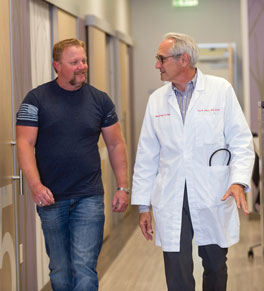Feeling your best when you have cancer

UCI Health medical oncologist Dr. Paul H. Coluzzi helps cancer patients and survivors like Dan Wheeler to improve their quality of life. (Photo credit: Michael Der)
Receiving a cancer diagnosis can turn a person’s life upside down. The ensuing treatment and recovery often taxes an individual on every level: physically, mentally, emotionally and spiritually.
Our UCI Health Cancer Support and Survivorship Services program is designed to support cancer patients throughout their journey, providing care that improves quality of life and lessens the burden of cancer.
The program has two components: managing patients’ symptoms and providing supportive care, and a survivorship program for patients when treatment is completed. These are services that most health insurance typically covers.
UCI Health medical oncologist Dr. Paul H. Coluzzi explains why the program exists and how it works:
What are cancer support services?
Our program is a multidisciplinary approach to help patients cope with symptoms related to the cancer and the treatments for cancer.
We promote quality of life for patients during and after their treatment with symptom management, survivorship services and psychosocial support.
Why is this important for cancer patients?
We know through research that when we ask patients to report their symptoms there is evidence of improved survival for patients.
At least five randomized trials, which were rigorously conducted at high-quality institutes, show that when patients are asked proactively about their symptoms, doctors are able to intervene sooner. This complements what we already know happens when we support patients through psychosocial counseling and support groups.
We also know that good symptom management improves cancer survival.
How many cancer patients may be in need of supportive services?
We know that up to 30% or 40% of patients experience some type of symptoms related to the cancer or cancer treatment for as long as 10 years after treatment.
We see symptoms along the entire continuum of the patient experience; it’s not just during the first four to six months of treatment. It’s beyond that.
In traditional oncology, services are very focused on the anti-cancer treatments. Sometimes the patient’s experience is overlooked.
Our program assists patients with symptoms and needs such as:
- Pain
- Nausea
- Anxiety
- Depression
- Fatigue
- General distress about diagnosis and treatment
- Chemotherapy-induced neuropathy
- Sex and intimacy issues
- Memory or concentration loss (chemo fog)
- Weight changes/nutrition
- Menopausal symptoms
- Spiritual care needs
- Wellness
- Establishing the goals of care
Do patients tell their oncologists about cancer-related side effects, such as depression, pain or fatigue?
They are very reluctant to report these symptoms because they feel they’ve had, or are receiving, great cancer care, and they don’t want the doctor to lose that focus.
They are willing to put up with symptoms, but the message of our program is that they don’t have to.
How does the program work?
Patients are referred by their doctors and seen by me and our nurse practitioner, Meetal Dharia, MSN, NP. She is a specialist in cancer support.
We see the patient as a team and make referrals to a psychologist, psychiatrist or social worker as needed.
We can also refer patients to a dietitian, and we collaborate with the Susan Samueli Integrative Health Institute, which is part of UCI Health.
Why is UCI the right place for this kind of program?
This program brings other aspects of care already available at the cancer center closer to the patient in a way that makes needed services are more accessible and coordinated.
Will you conduct research as part of the program?
Yes. Research is what distinguishes us from community-based programs. One of our missions is to strive to learn more.
We collaborate with a rich, interdisciplinary program called Biobehavioral Shared Resource at the UCI Health Chao Family Comprehensive Cancer Center.
The program staff members assist researchers in incorporating patient-reported outcomes into their research projects.
What are some of the tools you use to help patients with symptoms?
For some of the better understood symptoms, such as neuropathy, insomnia and depression, we have medications.
But we draw on both traditional medicine as well as integrative and psychosocial approaches. Patients often benefit from services offered by the Samueli center, such as acupuncture, massage therapy and myofascial release, which is a type of physical therapy to treat chronic pain.
How do patients typically respond when they receive cancer support services?
Our patients are happy to have the extra time to talk about their cancer experience and the symptoms they are experiencing.
They really appreciate it when we can talk about on symptoms, not the treatments. They feel listened to. We are concentrating on what is most important to them.
Explore Further
Browse more blog posts by topic.




